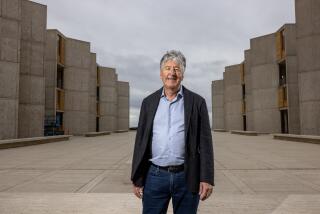Gale to Head Westlake Cancer Unit : Health: The renowned doctor will direct a new bone marrow transplant program at medical center, officials say.
- Share via
Dr. Robert Gale, who gained international renown for his work with victims of the Chernobyl nuclear disaster, will direct a new bone marrow transplant program at Westlake Medical Center, hospital officials announced Thursday.
Gale, 47, considered a pioneer in bone marrow transplants, will start up and oversee the hospital’s Comprehensive Cancer Center, hospital officials said.
“We hope his presence at Westlake will allow us to establish an internationally recognized cancer center here,” said Patrick McDonough, the center’s executive director.
In an interview Thursday, Gale said the mission of the program will be to make such transplants more affordable and more successful. Bone marrow transplants now cost $100,000 or more and have a success rate of 20% to 40%, he said.
Patients who undergo bone marrow transplants require drug treatment so intense that it could not only wipe out the cancer, but the bone marrow as well, Gale said. The operation involves drawing blood and bone marrow cells from a donor, then transfusing those cells into the cancer patient, he said.
Gale also will serve as the corporate director of bone marrow transplantation and other programs for Salick Health Care, the corporation that co-owns the cancer center and nine other centers around the country, Salick officials said.
“We think we will be able to provide a unique level of cancer care and treatment at Westlake,” said Mike Servais, an assistant vice president of Universal Health Services, the for-profit corporation that owns Westlake Medical Center.
Gale has been a member of the oncology faculty at UCLA Medical Center for the past 23 years. Increasingly, he said, he has grown frustrated because discoveries he and his colleagues make in the research lab often take years to reach the private sector.
Though bone marrow transplants are sometimes the only hope left for certain types of cancer patients, many insurance companies refuse to pay for the procedure because of the exorbitant cost and relatively low success rate, he said.
Gale has said the chance to direct such a large-scale, well-funded effort would help him realize his dream of discovering a cure for cancer.
He said Thursday that he hopes to bring procedures to the private sector that so far have been limited to universities because of physicians’ reluctance to break with their usual practice.
“I consider this kind of an experiment,” he said. “Can I use the past 20 years of research to accomplish (bone marrow transplants) on the front lines? (Salick executives) have told me they’re not only interested in doing it more cheaply, but in investing in research as well.”
During his tenure at UCLA, Gale aroused controversy and was investigated by federal authorities for allegedly using experimental treatments on dying patients without proper authority and without demonstrating that he had informed patients about their treatments.
However, he maintained that the treatments were not experimental and that he made patients fully aware of what he was doing.
Gale will arrive at Westlake’s cancer center Sept. 1, a week before the center officially opens to patients, and will spend most of the next year there.
The Westlake cancer center is the only Salick facility in which the center’s doctors have control over inpatient as well as outpatient treatment, Salick officials said. Most Salick cancer care centers advertise their one-stop, state-of-the-art cancer treatment for outpatients. Patients who stay overnight must check into an adjoining hospital.
Bone marrow transfusions, however, are often inpatient procedures, Gale said. At Westlake, Gale will have the flexibility to perform either procedure and then follow up on the patients, Salick officials said. If he is successful in streamlining the operation, they said, he will travel to other Salick facilities around the country--including a center at Cedars-Sinai Medical Center in Los Angeles--to teach them what he has learned.
“My goal is to get all the 10 centers working together in a synchronous way,” Gale said. “With 10 centers, you can approach some really important (scientific) questions.
“While we are treating patients,” he said, “there is no reason why we can’t do good science.”
More to Read
Sign up for Essential California
The most important California stories and recommendations in your inbox every morning.
You may occasionally receive promotional content from the Los Angeles Times.












